france
Making Migrants Disappear
In Calais, a migrant camp is replaced by manufactured “re-enchantment.”
Book at Lunchtime: Born to Write
A TORCH Book at Lunchtime webinar on ‘Born to Write: Literary Families and Social Hierarchy in Early Modern France’ by Professor Neil Kenny. Book at Lunchtime is a series of bite-sized book discussions held weekly during term-time, with commentators from a range of disciplines. The events are free to attend and open to all.
About the book:
It is easy to forget how deeply embedded in social hierarchy was the literature and learning that has come down to us from the early modern European world. From fiction to philosophy, from poetry to history, works of all kinds emerged from and through the social hierarchy that was a fundamental fact of everyday life. Paying attention to it changes how we might understand and interpret the works themselves, whether canonical and familiar or largely forgotten. But a second, related fact is much overlooked too: works also often emanated from families, not just from individuals.
Speakers:
Professor Neil Kenny is a Professor of French at Oxford University, a Senior Research Fellow at All Souls College and Lead Fellow for Languages at the British Academy. He specialises in early modern French literature and thought, especially from the early sixteenth to the mid-seventeenth century. Professor Kenny’s current focus is on the relation of literature and learning to social hierarchy and previous projects have investigated different kinds of knowledge and belief.
Professor Caroline Warman is a Professor of French Literature and Thought at Oxford University, and President of the British Society for Eighteenth-Century Studies. She specialises in the circulation of ideas and materialist thought and has recently completed a book on Diderot called The Atheist’s Bible: Diderot and the ‘Eléments de physiologie’.
Professor Ceri Sullivan is a Professor of English Literature at Cardiff University and the author of five books on the literary features that structure early modern texts about religion, trade, bureaucracy, and rhetoric. She is the general editor of the English Association's series Essays and Studies and her most recent publication is Shakespeare and the Play Scripts of Private Prayer.
The 2020 Besterman Lecture: Who were the French Revolutionaries?
TORCH Goes Digital! presents a series of weekly live events Big Tent - Live Events! Part of the Humanities Cultural Programme, one of the founding stones for the future Stephen A. Schwarzman Centre for the Humanities. In collaboration with the Voltaire Foundation, TORCH is delighted to support the Annual Besterman Lecture, 2020
Lecture by Professor William Doyle. Introduced by Karen O'Brien (Head of Humanities Division, Oxford University) and Gregory S. Brown (General Editor of Oxford University Studies in the Enlightenment and Senior Research Fellow, Voltaire Foundation). Moderated by Professor Lauren Clay, Vanderbilt University.
When Napoleon in 1799 declared that the French Revolution was over, he said that was because it was now established on the principles with which it began. The implication was that much of what had happened over the preceding decade of upheaval had not been in accordance with those principles. Napoleon took care, of course, not to state what they were: his constitution was the first since 1789 not to contain a declaration of basic rights. Yet everyone during the Revolution claimed to be acting on revolutionary principles, or denounced their opponents for betraying them. Can we distinguish between those who held to and those who ignored or compromised revolutionary aspirations? This lecture will make the attempt, challenging some of the most enduring assumptions in revolutionary historiography.
Professor William Doyle
Professor William Doyle is Professor Emeritus of History and Senior Research Fellow, University of Bristol. Professor Doyle is a British historian, specialising in 18th-century France, and is most notable for his one-volume Oxford History of the French Revolution (1st edition, 1989; 2nd edition, 2002; 3rd edition, 2018). Professor Doyle one of the leading revisionist historians of the French Revolution, obtaining his doctorate from the University of Oxford with a thesis entitled The parlementaires of Bordeaux at the end of the eighteenth century, 1775-1790 - he is also the author of sixteen books on French and European history, five of which have been translated into Chinese. Professor Doyle is also a fellow of the British Academy and a co founder of the The Society for the Study of French History.
Introduced by:
Karen O'Brien, Head of Humanities Division, Oxford University. Before taking on this role in 2018, Professor O’Brien was Vice Principal (Education) and Professor of English Literature at King’s College, London. At King’s she oversaw institutional strategy for all undergraduate and postgraduate students, the university Maths school, admissions and widening access, and the financing and implementation of student-facing capital projects. She implemented major changes in the areas of online degrees and digital learning, new classroom and clinical teaching spaces, careers and co-curricular learning. Prior to this, she was Pro-Vice Chancellor at Birmingham University and held academic posts at Warwick, Cardiff and Southampton Universities. Originally educated at Oxford, she held a Harkness fellowship at the University of Pennsylvania and a research fellowship at Peterhouse, Cambridge where she is now an Honorary Fellow. She is a trustee of the Rhodes Trust, a trustee of Chawton House, a member of Princeton University Press’s European advisory board and a Fellow of the Royal Society of Arts.
In addition to being Head of the Humanities Division, she is a professor in the Faculty of English at the University of Oxford. Her research focuses on the Enlightenment and eighteenth-century literature, particularly the historical writing and fiction of the period.
Professor Gregory S. Brown, Professor of History; University of Nevada, Las Vegas, Senior Research Fellow; Voltaire Foundation and general editor of OSE.
He is author, with Isser Woloch, of Eighteenth-Century Europe: Tradition and Progress (2nd edition; Norton, 2012), and author of Cultures in Conflict: The French Revolution (Greenwood, 2003); and A Field of Honor: Writers, Court Culture and Public Theater in French Literary Life from Racine to the Revolution (Columbia, 2002). Professor Brown will be delivering the ASECS-BSECS lecture at this winter's virtual BSECS conference, on the intellectual origins of "eighteenth-century studies.
Moderated by:
Professor Lauren Clay, Vanderbilt University. Lauren R. Clay is an historian of Old Regime and revolutionary France and its empire, with particular interests in urban cultural and civic life and the emergence of a commercially oriented society. Her book Stagestruck: The Business of Theater in Eighteenth-Century France and Its Colonies (Cornell University Press, 2013) examines the establishment of professional public theaters in cities throughout France and the French empire during the prerevolutionary era. Stagestruck was awarded Honorable Mention for the 2014 Barnard Hewitt Award for Outstanding Research in Theatre History by the American Society for Theatre Research and was named a finalist for the 2013 George Freedley Memorial Award, for exceptional scholarship examining live theatre or performance, awarded by the Theatre Library Association. Her article “Provincial Actors, the Comédie-Française, and the Business of Performing in Eighteenth-Century France,” in Eighteenth-Century Studies (2005) was the co-winner of the 2006-2007 James Clifford Prize, awarded by the American Society for Eighteenth-Century Studies. She has a chapter on Voltaire’s fortunes at the box office forthcoming in Databases, Revenues, & Repertory: The French Stage Online, 1680-1793/Données, recettes et répertoire. La scène en ligne (XVIIe-XVIIIe siècles), Eds. Sylvaine Guyot and Jeffrey S. Ravel (MIT Press, 2020).
Lauren's work has also appeared in The Journal of Modern History, Slavery and Abolition, and The Oxford Handbook of the French Revolution. Currently, she is writing about the debate over the legality of the slave trade during the early French Revolution. Lauren completed her PhD in history at the University of Pennsylvania. Prior to joining Vanderbilt, she spent several years teaching at Texas A and M University. Her scholarship has been supported by grants and fellowships from the National Endowment for the Humanities, the Newberry Library, the American Society for Eighteenth-Century Studies, the Woodrow Wilson National Fellowship Foundation, and the Fulbright Program. She teaches courses on the history of early modern France, the economic history of the eighteenth century, revolutions in the modern world, European imperialism, and the history of Paris. She is a past Co-President of the Society for French Historical Studies.
Travel Photoblog II: France, October 1-6 2019
After Krok, I flew from Moscow to Paris via Helsinki. My destination was this conference in the Loire Valley.
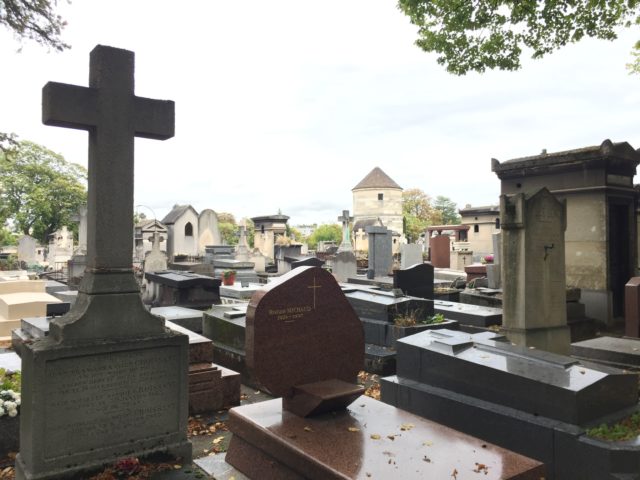 My cheap Paris hotel was near this cemetery.
My cheap Paris hotel was near this cemetery.
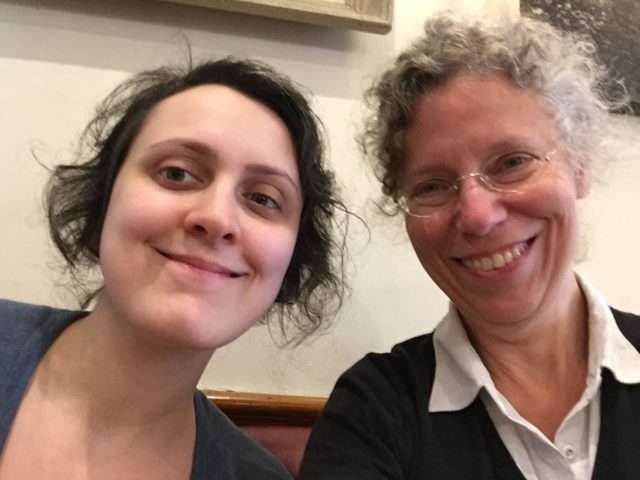 I stayed in Paris just long enough to meet sister radical feminist Cecilia for lunch at a crêperie near Gare Montparnasse.
I stayed in Paris just long enough to meet sister radical feminist Cecilia for lunch at a crêperie near Gare Montparnasse.
 Leaving Paris on a TGV. France has excellent trains that put the US to shame.
Leaving Paris on a TGV. France has excellent trains that put the US to shame.
 A double rainbow as seen from the train. A trainbow?
A double rainbow as seen from the train. A trainbow?
 Changing trains in Tours.
Changing trains in Tours.
 French trains have dedicated bicycle areas, while in the US, I can’t even take my folded Brompton on a bus between Champaign and Indianapolis without the driver yelling at me.
French trains have dedicated bicycle areas, while in the US, I can’t even take my folded Brompton on a bus between Champaign and Indianapolis without the driver yelling at me.
 From the taxi from in Saumur to l’Abbaye Royale de Fontevraud, I saw yet another rainbow.
From the taxi from in Saumur to l’Abbaye Royale de Fontevraud, I saw yet another rainbow.
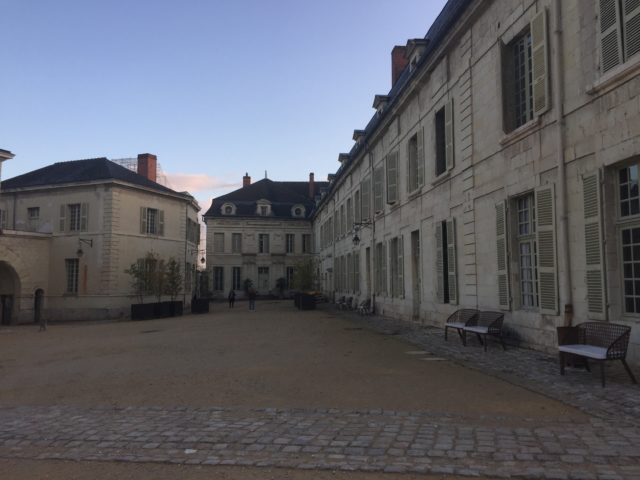 The “royale” part of l’Abbaye Royale de Fontevraud, the “palais” where artists-in-residence are housed.
The “royale” part of l’Abbaye Royale de Fontevraud, the “palais” where artists-in-residence are housed.
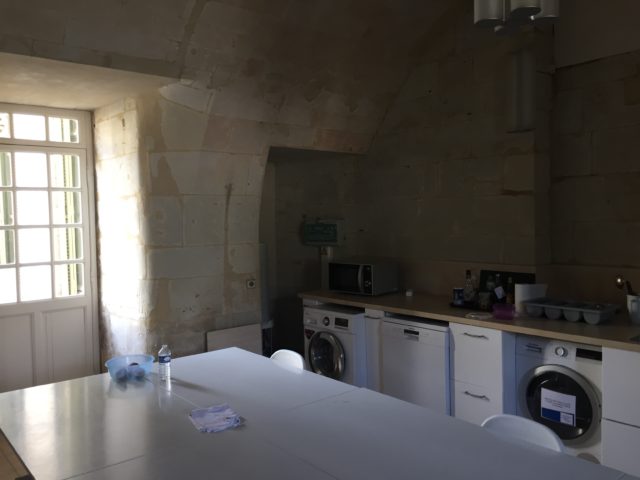 Residents eat, chat, and do laundry in this common area. I was not a resident, just visiting to speak at the annual animation conference. But I had to do laundry after 10 days in Russia, so I used their washing machine.
Residents eat, chat, and do laundry in this common area. I was not a resident, just visiting to speak at the annual animation conference. But I had to do laundry after 10 days in Russia, so I used their washing machine.
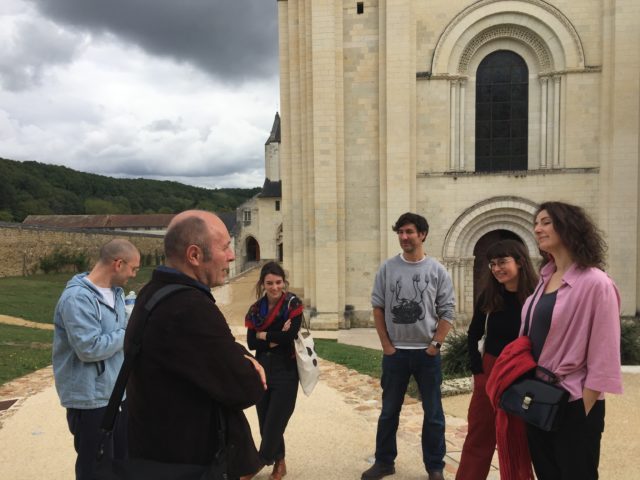 A fresh batch of international animation residents had just arrived, and I joined them on this tour of l’Abbaye.
A fresh batch of international animation residents had just arrived, and I joined them on this tour of l’Abbaye.
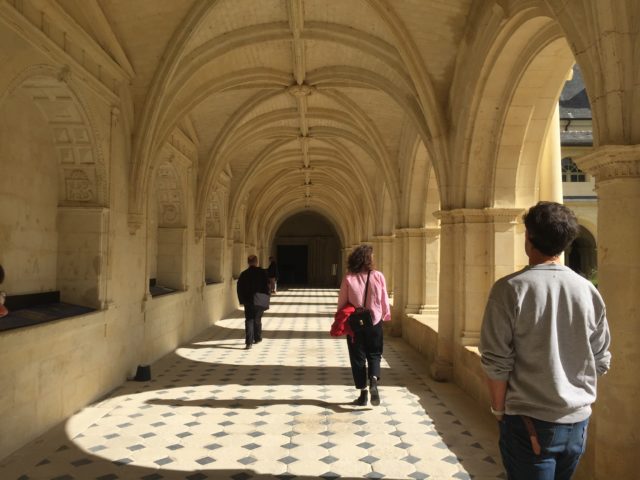 Cloisters galore.
Cloisters galore.
 The magnificent late-Romanesque cathedral.
The magnificent late-Romanesque cathedral.
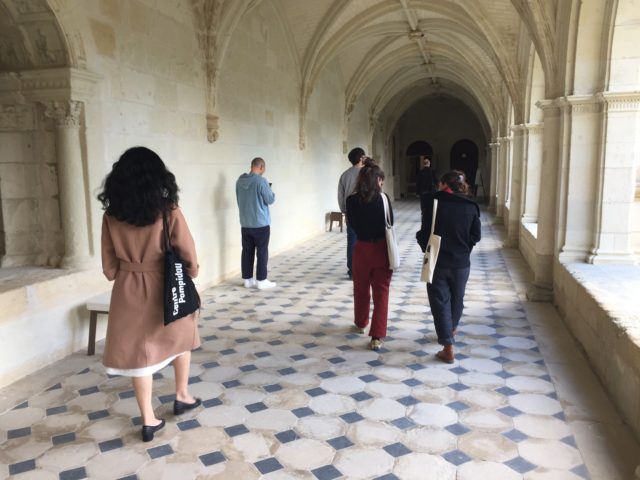 More cloisters and animators.
More cloisters and animators.
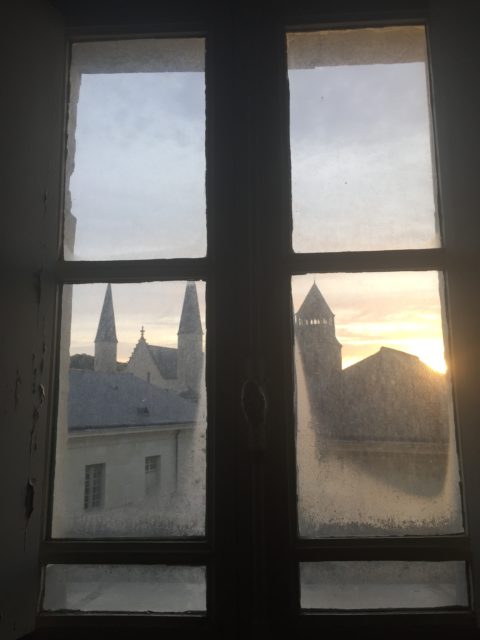 The view from my window in the morning.
The view from my window in the morning.
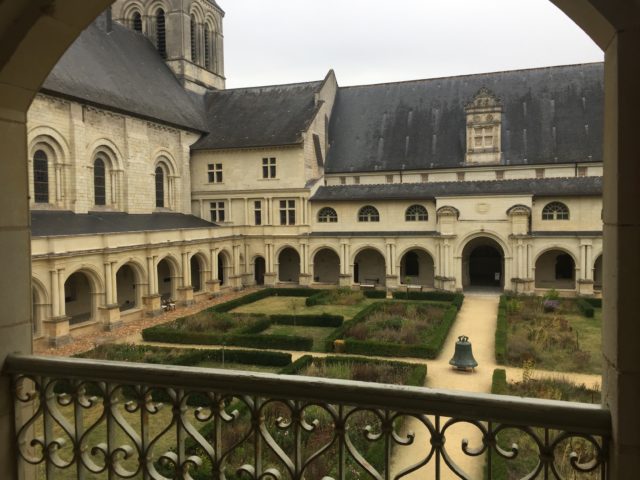
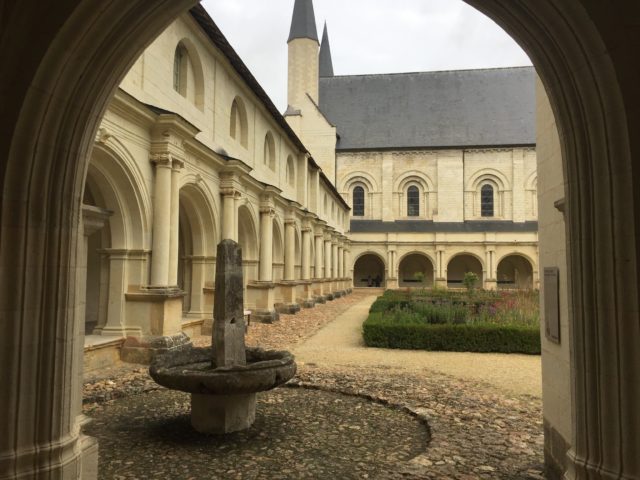
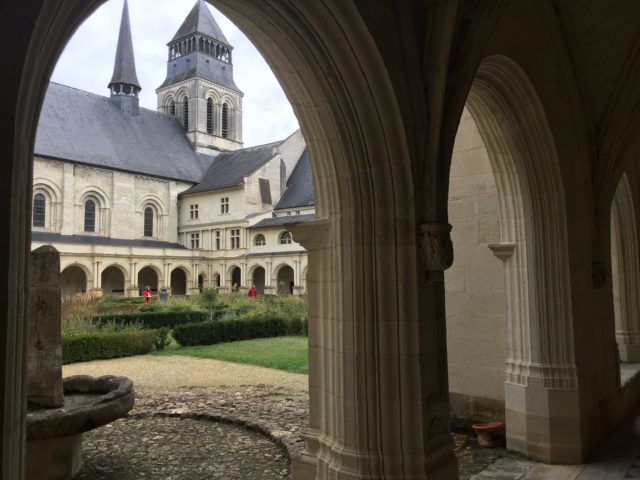
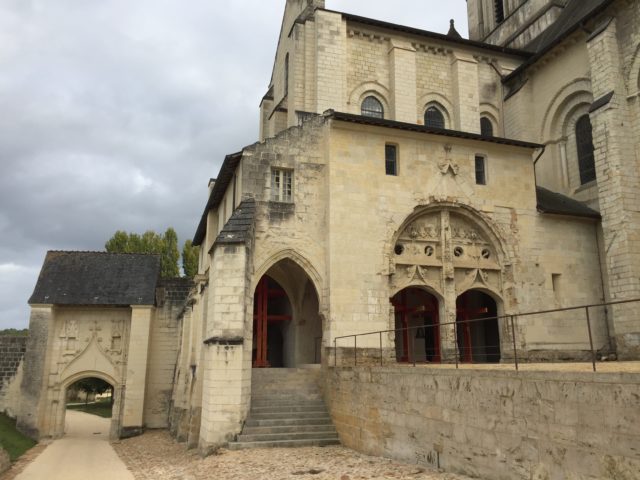
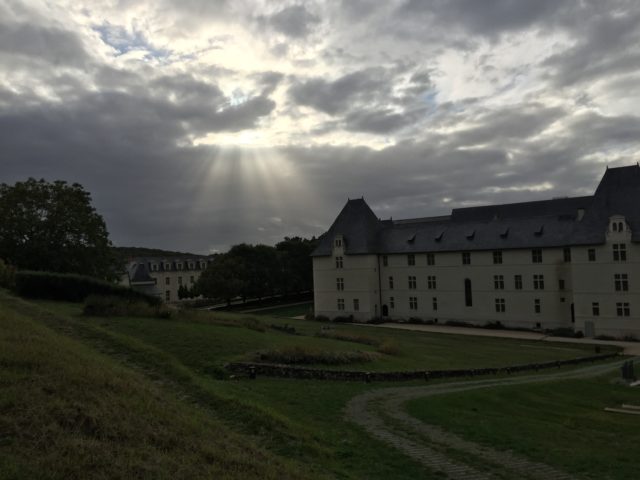
 It looks so peaceful, doesn’t it? But they were doing construction most of the time, and the drone of power tools and compressors was nearly constant on weekdays.
It looks so peaceful, doesn’t it? But they were doing construction most of the time, and the drone of power tools and compressors was nearly constant on weekdays.
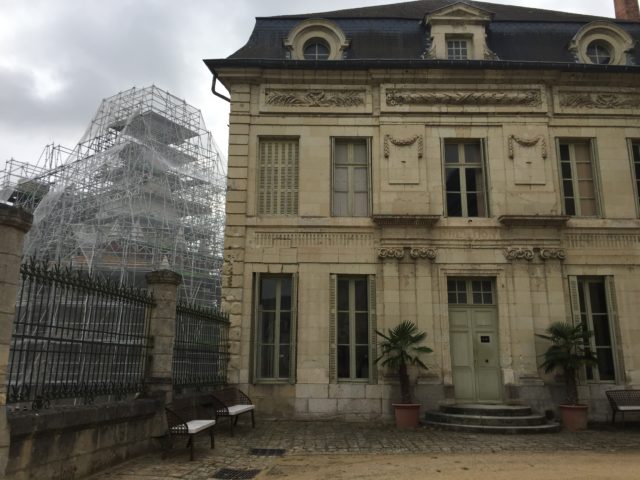 The architecturally magnificent chimney towers of the ancient kitchen were under scaffolding and submitting to power tools as well. They say they’ll be done in 2021. I may apply to be a resident then so I can come back and see them in their full glory.
The architecturally magnificent chimney towers of the ancient kitchen were under scaffolding and submitting to power tools as well. They say they’ll be done in 2021. I may apply to be a resident then so I can come back and see them in their full glory.
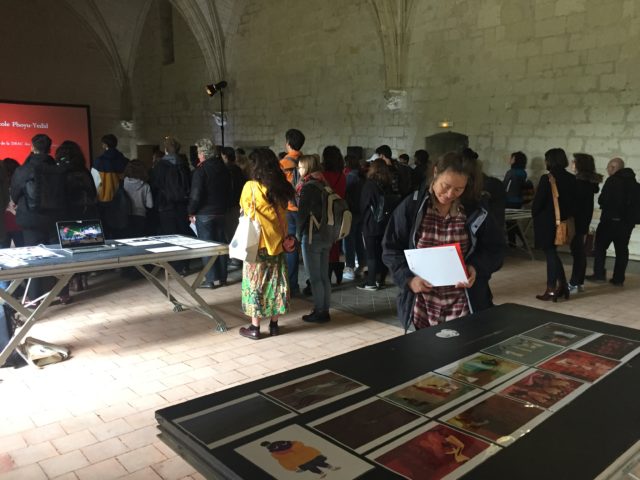 The conference opened with displays and presentations from the animators-in-residence. I didn’t take many pictures of the conference itself, and I have no photo from my own talk, with Jayne Piling, but it was apparently well received. I think my take on copyright abolition made some heads explode.
The conference opened with displays and presentations from the animators-in-residence. I didn’t take many pictures of the conference itself, and I have no photo from my own talk, with Jayne Piling, but it was apparently well received. I think my take on copyright abolition made some heads explode.
 I got to eat breakfast at the swanky hotel, where they had this over-designed tableware. Instead of having a ridge like a normal saucer, this one had a curved cone protruding from its center, on which nestled the reciprocal inverted cone of the teacup.
I got to eat breakfast at the swanky hotel, where they had this over-designed tableware. Instead of having a ridge like a normal saucer, this one had a curved cone protruding from its center, on which nestled the reciprocal inverted cone of the teacup.
 It was design-for-design’s-sake, serving no purpose but to remind diners they were somewhere expensive, which was probably the point.
It was design-for-design’s-sake, serving no purpose but to remind diners they were somewhere expensive, which was probably the point.
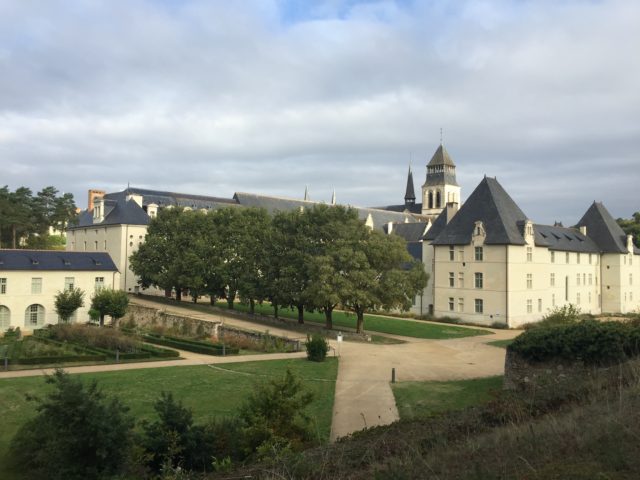 I took more photos around the ever-photogenic Abbey my last morning.
I took more photos around the ever-photogenic Abbey my last morning.
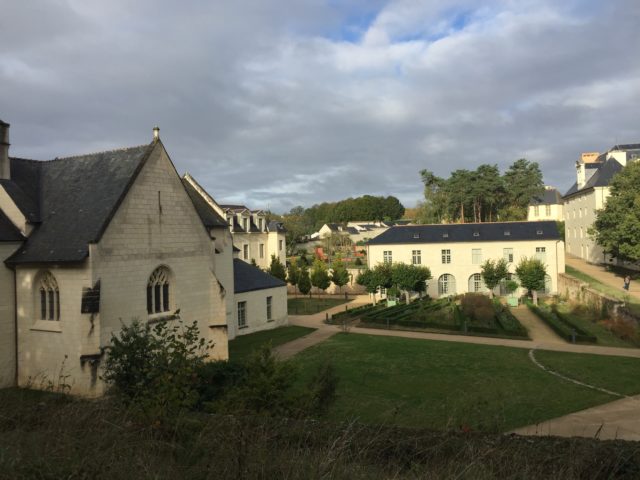
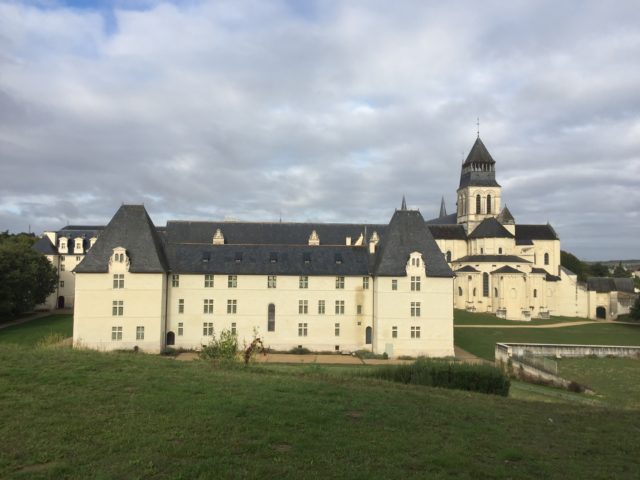

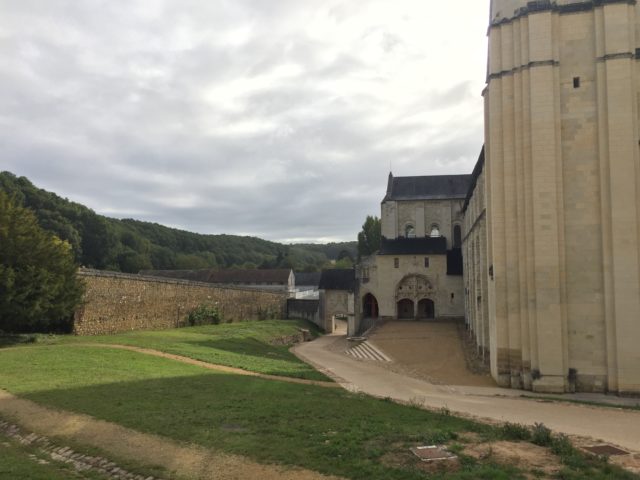
 The French famously respect comics as an art form. In a bookshop in Saumur I came across this large hardbound graphic biography of George Orwell, among many other handsome and diverse comics.
The French famously respect comics as an art form. In a bookshop in Saumur I came across this large hardbound graphic biography of George Orwell, among many other handsome and diverse comics.
 After a few more French train rides I checked into this Ibis hotel at the Paris Charles de Gaulle Airport.
After a few more French train rides I checked into this Ibis hotel at the Paris Charles de Gaulle Airport.
 It had a pretty good view, considering.
It had a pretty good view, considering.
The next morning I took my cattle-class seat on the plane to Chicago, and now I’m back in Urbana, IL, which feels even less glamorous than it did before (which was not at all). Au revoir, France! Das vedanya, Russia!